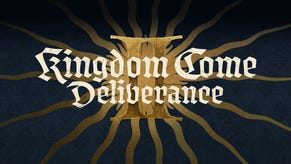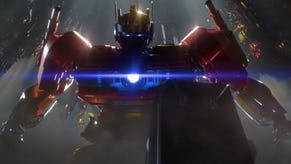A Guiding Light: The indie journey of Waveform
Waveform has all the hallmarks of the next big thing. Get on board right now as we chat with its creator.
Waveform looks amazing. Channeling some of the chillax spirit of games like Audiosurf, Chime, and the Bit.Trip series, players manipulate the travel path of a particle of light, matching a series of patterns, collecting objects, and capitalising on the properties of a wide variety of obstacles. In the best traditions of the modern indie movement, it's simple, beautiful, and entirely different.
"We’ve made Waveform to be a unique experience that is fun for everybody," founder, CEO and chief designer Ryan Vandendyck told us.
"I know that’s pretty cliché to say, but I’ve put a wide range of people in front of the game, from super hardcore gamers to those who barely play games at all, and everyone has had a great time. The serious gamers love the unique gameplay and old-school arcade action, while others really love moving the wave around and find it oddly hypnotic and soothing."
It's also expensive. This is not the kind of game major publishers dole out cash for, and as such, developer Eden Industries is running on the fumes.
"Development so far has been funded by slowly draining my personal bank account," Vendendyck admitted.
"Thankfully I was able to work with some fantastic people that did a lot of work for free up front in exchange for a share in the profits. But the artwork was all paid for, which was the major expense in the development, in addition to miscellaneous costs like hardware and software licenses, business expenses, etc."
While the generosity of contributors helped make Waveform happen, it also ruled out taking advantage of funding schemes, which tend to struggle with non-traditional business models.
"Really, the only way I could afford to develop Waveform was by working full-time at [Luigi's Mansion developer] Next Level Games in order to earn an income and develop Waveform on the side," the designer continued.
"Although this helped me mitigate the financial risk, it also contributed to the fact that Waveform has taken a long time to develop – almost 3 years by the time it’s released."
For most of those three years, Vandendyck has worked more than 80 hours a week, a struggle he has documented on a Gamasutra blog.
That's not to say he regrets his time served in mainstream development; Vandendyck is a lifelong gamer who won a four month paid internship with Next Level while still at university, and did a stint with Too Human developer Silicon Knights before he decided to go indie. Next Level games offered him full-time work on his old stomping ground while he pursued his passion project, and he jumped at it.
"Next Level Games is a great place to work, and I get to work on some awesome games. Right now I’m doing the ghost AI for Luigi’s Mansion 2 and it’s a fantastic experience," he enthused.
"But the thing is, and I’m sure many game designers will say the same thing, I have so many game ideas in my head that I feel the need to get some of them out before I go crazy! Thankfully I have the programming ability to do just that, so I decided to quit imagining games and just get to work making them."
As an independent, Vandendyck can follow his own interests without answering to the pursestrings - something traditional companies find very difficult.
"That freedom is really what compelled me to make games aside from my full-time job, and indeed what attracts me to the indie scene in general," he said.
"That freedom is really what compelled me to make games aside from my full-time job. Until I had a working prototype of Waveform, people were very sceptical that a game about manipulating a wave would be fun! But I had faith in it so I forged ahead, and being an indie gave me the ability to do that."
"Until I had a working prototype of Waveform, people were very sceptical that a game about manipulating a wave would be fun! But I had faith in it so I forged ahead, and being an indie gave me the ability to do that."
Another freedom of going indie is total control of a project's future development; is a sequel or spin-off is ever developed, Vandendyck won't have to watch his brand transform - or fail to transform - in ways which abandon his original vision.
"I love Waveform and have put the majority of my life over the last couple years making it, so I wouldn’t part with it easily," he noted.
"I only feel like I’ve unearthed the tip of the iceberg when it comes to what fun experiences can be brought to life with this style of gameplay.
"That being said, my main desire is to keep on making games. I’m not too concerned with money beyond having enough to make another game, so if selling my IP gave me the chance to keep on making games, then that’s really a no-brainer for me.
"My main strength in making games is in rapidly developing prototypes out of game ideas. Waveform is actually the third prototype I’ve made and I have others planned out. So even if I were to sell the IP, I’m not at a loss for ideas so I think I’d be ok," he added.
"I was in talks with a publisher to bring Waveform to a console through the digital download service but it didn’t get too far. And I’m actually a bit relieved by that to be honest. Although it’s meant more hard work on my end making the game without publisher support, it’s been a fantastic learning experience for me and one that I hope will pay off in the end since I own the IP and I’m not bound to anyone."
Money Down
With 26 days to go, a Kickstarter fund to get Waveform out the door has under $3000 of its $8000 goal in pledges. It's an all-or-nothing scheme, so if backers can't be found, Eden Industries won't see a cent. It's still early days, but given the company's modest and humble goals, the response is a little disappointing.
"I’m not really doing this to make money," Vandendyck reiterated.
"Yes I’d love it if Waveform was hugely successful, since that’d enable me to make more and better games, but at the end of the day a big goal for me with Kickstarter was to interact with the community and give people a chance to play the game and contribute to the creation, which is what the rewards are structured around.
"The amount I asked for - $8000 - seemed like the right amount to help me push the game over the finish line with a bang instead of a whimper. Any less and I’d be paying for expenses out-of-pocket," he added, ominously.
Should Waveform meet its Kickstarter goal, Eden will pour the funds into a couple of streams - the first being more artwork for the game, a direct response to beta tester's feedback, and the second being hardware compatibility testing.
The remaining cash will go towards marketing a game which, standing outside genre boundaries, is difficult to describe.
"To be honest I feel like I haven’t done a great job of this so far, since a few news sites wrote about Waveform but misunderstood some crucial aspects of the game," Vandendyck noted.
"It’s a bit of a circular problem when it comes to Kickstarter since money will help me do better marketing but better marketing would’ve helped me raise more money."
Whether Eden secures its funding or not, the game will ship eventually - possible within a few months.
"We’re in talks with Valve to release it on Steam in the latter half of February, so that’s the deadline we’re shooting for and we’ll just polish it as much as possible between now and then," he said.
"Honestly we could probably release it now and it’d be fine, basically everyone who sees the game thinks it’s ready to be released. But it’s our first game, so we really want to hit it out the park when it comes to creating a really polished and tight game experience."





.jpg?width=291&height=164&fit=crop&quality=80&format=jpg&auto=webp)






